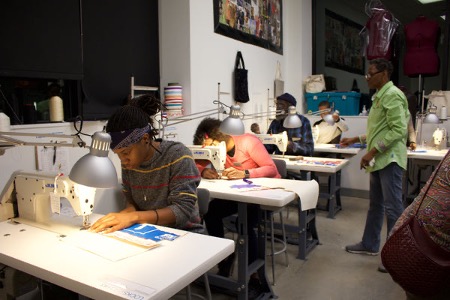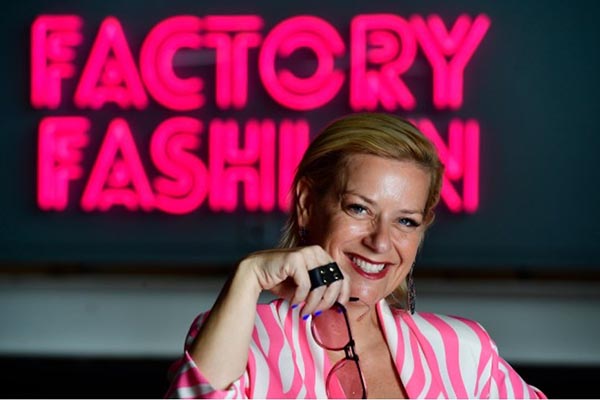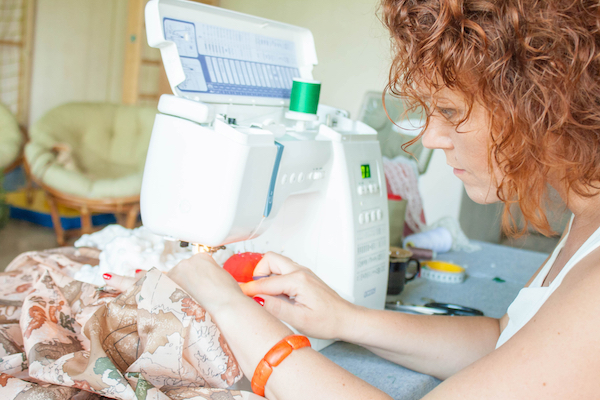In a number of articles and video interviews, we have shared the stories of organizations that are working to build the necessary talent to accelerate the reshoring of textiles and apparel, including home décor. We applaud these efforts and are thrilled to see even more pop up on the radar.
Some of these efforts, like Detroit-based ISAIC, have a strong focus on developing talent, combined with real-world manufacturing that makes training even more effective. Others, like Phoenix-based BMC.fashion, have unique processes in place to bring sewists up to speed quickly, and have been surprised by the actual availability of already-skilled sewing talent, both male and female, in their area. And then there is Spoonflower, now owned by Shutterfly, also training folks for its own production operation, which now has an expanded footprint thanks to the Shutterfly acquisition. For more on these companies, be sure to view our recent webinar where Jennifer Guarino of ISAIC, Kirby Best of BMC.fashion, and Kerry King of Spoonflower were panelists, along with textiles expert and WhatTheyThink contributor Debbie McKeegan.
Over the past month or so, I have seen articles about four more U.S., cut-and-sew operations, an encouraging development. An overview of each is provided here, based on news reports, and we’re also reaching out to them for a deeper dive!
SewLab USA
SewLab USA is a Baltimore-based manufacturing company that provides soft goods constructed from sustainably sourced materials. The company is focused on the value of Made in America, and states, “The spirit of SewLab USA lies in the steadfast history of manufacturing in the USA: quality products conscientiously constructed, not just by laborers but by highly trained artisans who are dedicated to their craft and their craftsmanship.”
Founded by Jeremiah Jones and Cecilia Grimm, their vision was to create a space that is simple, clean, centered around family values, and, most importantly, a teaching environment. The goal is for SewLab USA to be a catalyst for job creation, education, and creativity, and an enabler for the revitalization of Baltimore’s past leadership role in textiles and apparel. SewLab worked with Baltimore’s clothing, uniform, upholstery, and other soft goods manufacturers to develop and deliver a 12-week program of soft and hard skills training, site visits and temporary placements at operating businesses, culminating in the production of a product run for a local client.
Focused products include backpacks, fanny packs, tote bags, aprons, hats, masks and more. Custom design services are also available, and some of that work can be viewed here.

Image sourced from SewLab USA
Sparty Mill
North Carolina is clearly a textiles hub for the U.S., with a number of related businesses located in the state, as well as the Wilson College of Textiles, part of North Carolina State University. Fashion and home textiles executive Deanna Hodges purchased the old Duplan Mill, a historic textile mill that was long abandoned, back in 2020 as a home for a manufacturing facility and corporate headquarters. Located in Lincolnton, N.C., this cut-and-sew manufacturing operation has been named Sparty Mill. It’s a 147,000 square foot plant that will employ more than 100 workers and manufacture uniforms, apparel, safety gear, and other items for large retailers, brands, as well as the U.S. government. It will also assemble and ship pre-cut products. Segments within parent company Hodges International include contract manufacturing, private label and total package manufacturing for brands and entities of all sizes, as well as collegiate licensing.
According to an article originally published in The Sourcing Journal, “Between January 2020 and December 2021, new and expanding textile operations have created 1,400 new jobs and announced more than $285 million of investments in North Carolina, according to the North Carolina Community Investment Report. According to the Economic Development Partnership of North Carolina (EDPNC), employment in the state’s textile industry was 35,813 as of the second quarter of 2021, based on the Bureau of Labor Statistics Quarterly Census of Employment and Wages. This compares to about 33,000 people in 2019, EDPNC said. These workers are employed in 828 textile manufacturing facilities compared to 600 in 2019.” Clearly, North Carolina is well positioned to reclaim and maintain its leadership position in the U.S. textiles and apparel industry.
In other North Carolina news, last May WTIN announced it was working with VF corporation to sell a North Carolina on-demand manufacturing facility. We’re hoping to see yet another North Carolina operation revitalized, although information on the purpose and production platform of the VF facility has been hard to come by.
Aurora’s Factory Fashion
Out west, Skye Barker Maa and Lisa Ramfjord Elstun have established Factory Fashion as part of Aurora CO’s Stanley Marketplace. It’s part fashion design school and part sewing school and an incubator for designers. According to a recent article, four designers are currently participating in the Factory Fashion Small Batch Manufacturing initiative. To produce the clothing, the sewing students receive training in skills ranging from the fundamentals to haute couture. Training offered develops basic and advanced sewing skills as well as tailoring and alterations. In the article, Barker Maa said the school doesn’t just help people learn how to make clothes, but also how to get their work in front of people who might buy it—to start building a following. The organization casts a wide net in attracting people to the industry, including refugee communities and those leaving the prison population. They are even exploring how they might offer students help on a path to citizenship for those who need it.

Skye Barker Maa. Image sourced from The Denver Post.
Sonoran Stitch Factory
Arizona is quickly becoming a fashion hot spot. Most recently, we learned about the Sonoran Stitch Factory, a cut and sew manufacturer of women’s apparel and industrial sewn products for the health care industry, university and college dormitories, hotels, resorts, and cruise ships—located on Tucson’s north side, founded by Erica Yngve. It’s a 25,000 square foot facility that has grown to serve over two dozen apparel and sewn good companies across the country since 2020 and employs 16 people. Yngve is a 2000 University of Arizona graduate with two bachelor’s degrees in business management and German studies, and a master’s in business administration in 2005 from DePaul University in Chicago. She believes Tucson can become a strong hub for industrial sewers—attracting more companies and growing the economy.
Graduates of Yngve’s program can expect to start work with wages at $15 per hour with a career path that can result in increased wages, up to an earning potential of $100,000 per year, she says. The goal is to train up to 100 students per year in industrial sewing. Yngve partnered with the City of Tucson, the Pascua Yaqui Tripe, and MoonshotAz of Flagstaff to create the Arizona Stitch Lab. These partnerships and associated funding enable students to participate in a six-week course at the Arizona Stitch Lab at no cost to them. The course teaches students factory setting and machine safety protocols; industrial machine operations, including different stitch types; basic patterning, markers and cutting applications; introduction to fabrication; and materials and fabric handling. Future training will include sewing machine repair classes and 3D pattern-making for apparel and interior design.
Looking Ahead
These initiatives are filling an important role in the future of the textiles & apparel industry in the U.S., and are, we hope, just scratching the surface of what’s out there. If you are operating or aware of other cut-and-sew training and/or manufacturing operations, we’d be happy to highlight your efforts. Just contact me for an interview!















